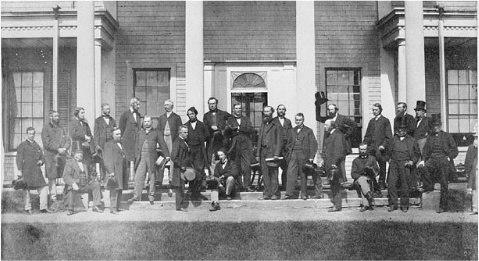An economic crisis that began with the building of the PEI railway ended with the Canadian government offering to take on the debt in exchange for PEI joining Canada. The Canadians were apparently afraid that the United States might nab the small colony, and their offer was generous; they didn’t just take on the rail debt, but offered a solution to the land issue as well.11. The government of Canada wasn’t influenced by landlords like the British had been, and they offered to use their sovereignty to force the landowners to sell whether they wanted to or not. It was what the British government had been refusing to do for years.

It wasn’t all good, though. Naturally, many Islanders were concerned about PEI losing independence. Campaigning as a pro-Confederation candidate was a surefire way to lose in the 1860’s and 70’s,12. and for some the discomfort of being a Canadian province would take decades to fade. There isn’t a lot of information on what residents of lot 64 thought of Confederation, but since the railroad didn’t yet extend to this area of the Island, it likely seemed that they’d paid a very high price for something that was of little benefit to them. That seems to be the case for one Murray River resident, who wrote this poem which was later found in an old home in the town:
Some verse I will write and the truth I will tell
The greatest curse that ever befell
On the day that our province went into Confed
Like an ox to the slaughter was traitorously led
I verily believe that no nation on earth
Since the world was created, such reptiles gave berth
As the traitors who sold us and those who ride
Rough shod on the people in their pomp and their pride
And yet there are those who delight to be led
Like the ox to the slaughter and quietly bled
And who follow their leaders through thick and through thin
And their dirty work do, and think it no sin
And this is the day they would ask us to bring
An offering of praise and their victory sing
But with hold the tongue and perish the voice
Who in praise of such sycophants would ever rejoice
Like the day of Job’s berth may it numbers not be
With the days of the year nor joy let it see
But darkness surround it like Egypt of old
And the smoke of the pit, its minions unfold
May the drums be all muffled, the flags half mast high
The death bells a-tolling and low be the cry
Of death to the traitors who sneeringly say
Come let us rejoice on Dominion Day
But the day may yet come and soon might it be
When the traitorous Crew and the notorious N.P.
May vanish like smoke and be driven away
And no sound of rejoicing on Dominion Day 19.
It’s signed A.C. Roberts and dated June 10th, 1885. Who was A.C. Roberts? Well, the only Roberts I could locate in the 1881 census13. with the initials A.C. was Aramintha Catherine Roberts, who would have been 14 years old at the time this poem was written. Maybe it was a school project, or maybe she was just very passionate about politics! Her family later showed up in the 1911 N.S. census14. after moving across the Strait to Pictou, and what became of her after that is unclear.